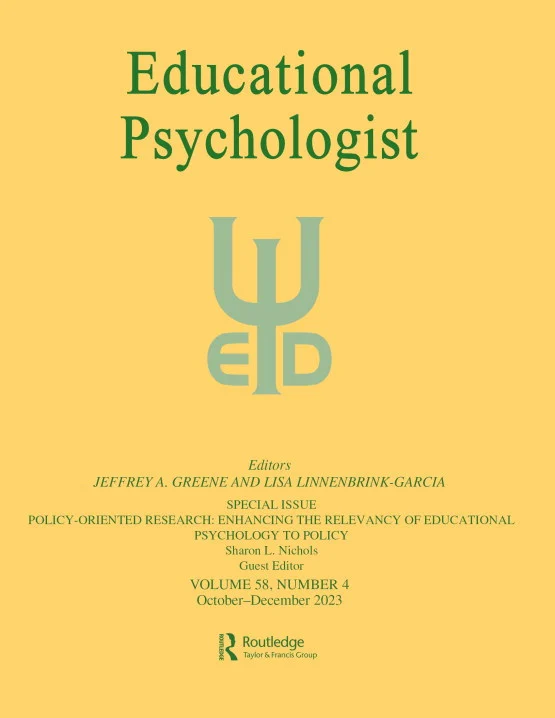学术发展的复杂社会生态:考察家长、教师和同伴对学生参与的集体影响的生物生态框架和例证
IF 11.4
1区 心理学
Q1 EDUCATION & EDUCATIONAL RESEARCH
引用次数: 27
摘要
在本文中,我们旨在通过对中系统效应的更丰富和更精确的概念化来促进对影响学生学业发展的复杂社会生态的更全面的理解。首先,在生物生态学模型的基础上,我们论证了集体影响的重要性,集体影响被定义为来自多个微系统的影响,这些微系统协同作用,塑造了学生的学术功能和发展。我们确定了三种集体效应可以运作的方式:(1)协同,(2)偶然,(3)顺序。其次,我们通过对32项关于家长、教师和同伴对学生学业投入影响的研究进行述评,证明了该框架的实用性。该框架用于对研究进行分类,整合研究结果,确定趋势,并为未来的研究提出方向。第三,我们通过纳入更具发展性、文化性、社会历史性和包容性的观点,探索了复杂社会生态学概念化和研究的下一步。本文章由计算机程序翻译,如有差异,请以英文原文为准。
The complex social ecology of academic development: A bioecological framework and illustration examining the collective effects of parents, teachers, and peers on student engagement
Abstract In this article, we aimed to contribute to a fuller understanding of the complex social ecologies that shape students’ academic development by focusing on richer and more precise conceptualizations of mesosystem effects. First, building on bioecological models, we argued for the importance of collective influences, defined as influences from multiple microsystems that act in concert to shape students’ academic functioning and development. We identified three ways collective effects can operate: (1) coactively, (2) contingently, and (3) sequentially. Second, we demonstrated the utility of this framework by using it to organize a narrative review of 32 studies of the effects of parents, teachers, and peers on students’ academic engagement. The framework was used to classify studies, integrate findings, identify trends, and suggest directions for future study. Third, we explored next steps in the conceptualization and study of complex social ecologies, by incorporating perspectives that are more developmental, cultural, sociohistorical, and inclusive.
求助全文
通过发布文献求助,成功后即可免费获取论文全文。
去求助
来源期刊

Educational Psychologist
Multiple-
CiteScore
19.10
自引率
3.40%
发文量
16
期刊介绍:
The Educational Psychologist is a scholarly journal dedicated to exploring the psychology of learning and instruction. Articles in this journal encompass a diverse range of perspectives, from examining psychological mechanisms to exploring social and societal phenomena related to learning and instruction. The journal publishes theoretical and conceptual articles, as well as reviews and meta-analyses, that significantly contribute to theory or advance the methods used to explore educational psychology. Emphasizing innovation and advancing understanding, the journal does not publish articles solely reporting the methods and results of empirical studies; instead, all submissions, including reviews and meta-analyses, must offer clear implications for advancing theory. In addition to regular articles, the journal features special issues that delve into important themes in educational psychology, along with focal articles accompanied by peer commentary.
 求助内容:
求助内容: 应助结果提醒方式:
应助结果提醒方式:


